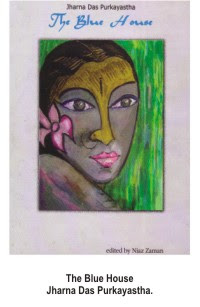Pain, sorrow and women's lives - review of Jharna Das Purkayastha's The Blue House

Jharna Das Purkayastha is very well known to Bengali readers. She has written numerous short stories. She won the Annanya Shahitya Puroshkar in 2008. The Blue House is a collection of twelve short stories which have been translated by different writers and edited by Niaz Zaman.
As I was reading the stories an all too well known picture of my surroundings, indeed the surroundings of most Bangladeshi women, came alive in the writing. The trivial events that we seldom take notice of, the humiliation women of this country face with no one taking note of them are the subjects of Purkayastha's stories. It seems as though these happenings are not important enough to be noted but Jharna Das Purkayastha does just that, makes readers see them. She depicts very ordinary events in such a way that she de-familiarises them, makes us see them anew. That is her expertise, her talent. She makes use of it in all her twelve stories.
'The Blue House' tells the story of young girls disappearing in the course of their studies. They get married and simply disappear. Abhimanu seizes his wife from behind which makes the newly wed woman shriek. People around the house are concerned as to what might have happened and thus a commotion is created. Everyone makes a big fuss about the event. Rituparna cannot understand where she has gone wrong and what is expected of her in her new found home. It takes her a while to realize that the comfort of her parents' home is no longer there in this house. She keeps reminiscing about her past and realizes that:
“Memories are hardly ever lost. They are just veiled by layers of the present.”
And that The Blue House will always burn quietly in her heart.
'The blue, green, yellow faces around us' is the story of a young village girl whose husband changes her name from Gulmohor to Rina as he thinks it is too old fashioned. She is changed into an urban housewife. It is a tale of how people give importance to wealth rather than to humane qualities, how the world values only moneyed people. So Gulmohor and her husband are dropped off halfway to their house on a stormy night. And the simple small town girl Gulmohor is lost in a crowd of blue, green and yellow faces.
'Jasmine Oleander Days' shows how all young girls have somehow to let go of their days full of the fragrance of jasmine and oleander as soon as they tie the knot with someone. This story is about Runu and her younger sister Dona. Both of whom must marry the boys their parents choose for them. Life changes for Runu once she becomes someone's wife. Dona fears that may be she will have the same fate.
One of the stories, 'Barbecue', draws comparisons between the needs of the poor and those of the rich. For the simple village girl Jaitun, a bare minimum of food will suffice for survival whereas for Mehnaz appetising heaps of barbecued chicken can be spoiled by Jaitun's inconsolable tears. The storm afflicted girl can only think of the mighty power of the tornado which has washed everything away from her life. As she hears the word barbecue, it comes as the term for a storm to her which only makes the lady of the house angry.
'Cascading Rain' is another story of pain and sorrow, insurmountable sorrow where the only son of the family commits suicide, as he cannot accept the way of life he and his parents have led. His father's meager earnings infuriate him. Most of his friends are well to do and so he has an inferiority complex throughout his childhood. As he reaches puberty the weight of the poverty just becomes too much for him to bear and he takes his own life.
The fragrance of 'The Night-Queen' announces its arrival, but the bad news travels even faster. Two street urchins have died of diarrhoea caused by rotten food from Nigar's house. That makes her very upset but there is nothing she can do. Inspired by her mother, Nigar is dead against the idea of wasting anything. This leads her maid into giving away the fermented polao to the street boys, who apparently fall ill from consuming it.
Most of the stories here are from women protagonists' point of view. Women share pain and sorrow through the changing face of society. The book can easily be termed as a page-turner. The writer has a commendable sense of and a keen eye for the anomalies of society. It is these she depicts in her fiction. It is a work to be highly recommended for readers.


Comments